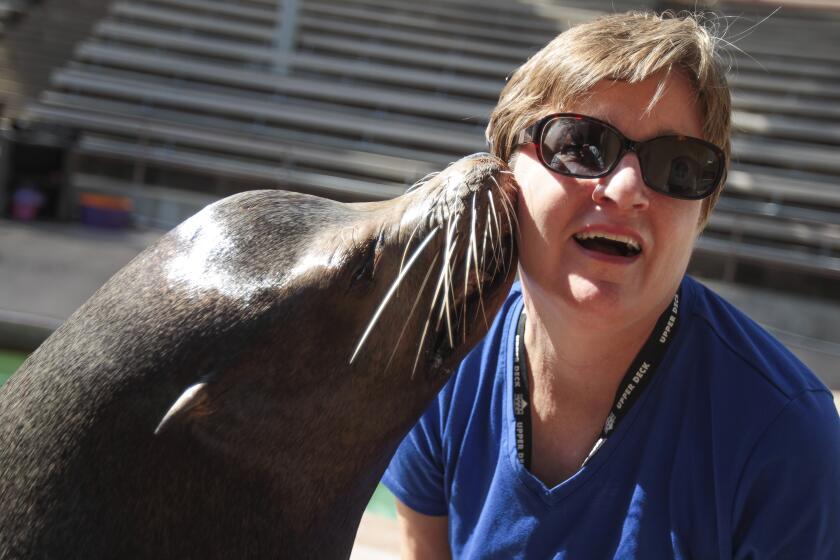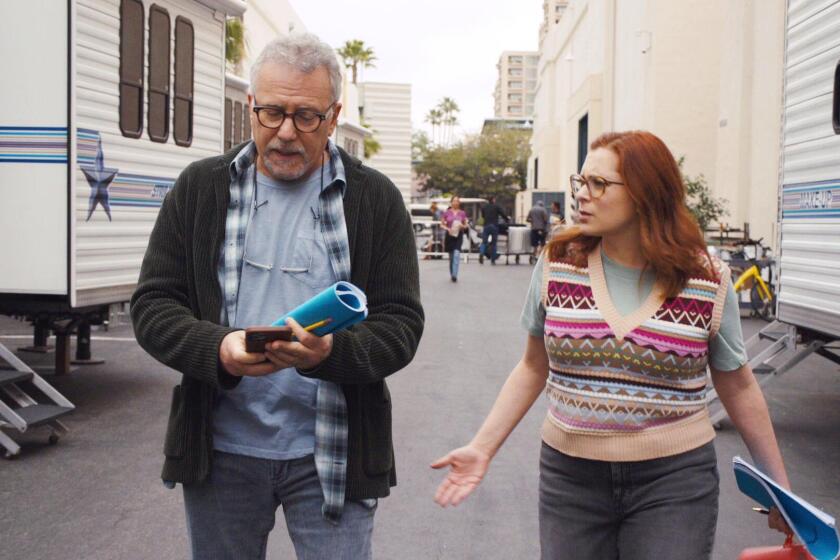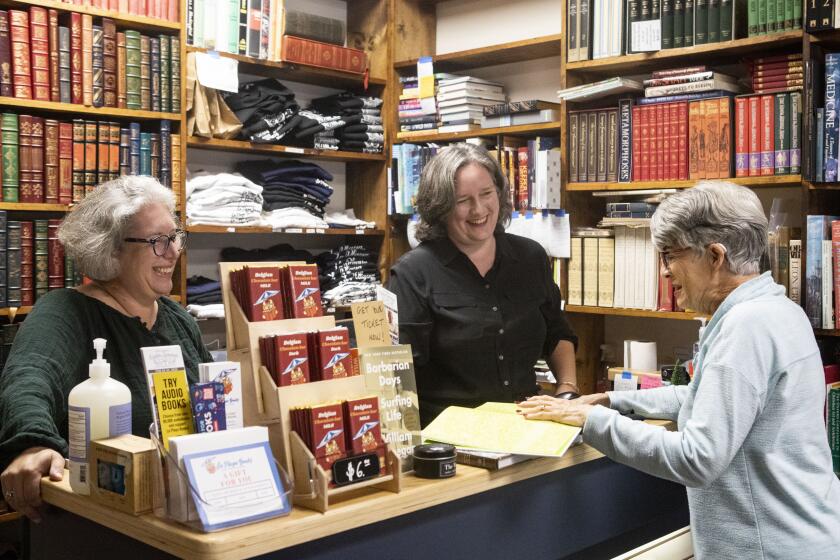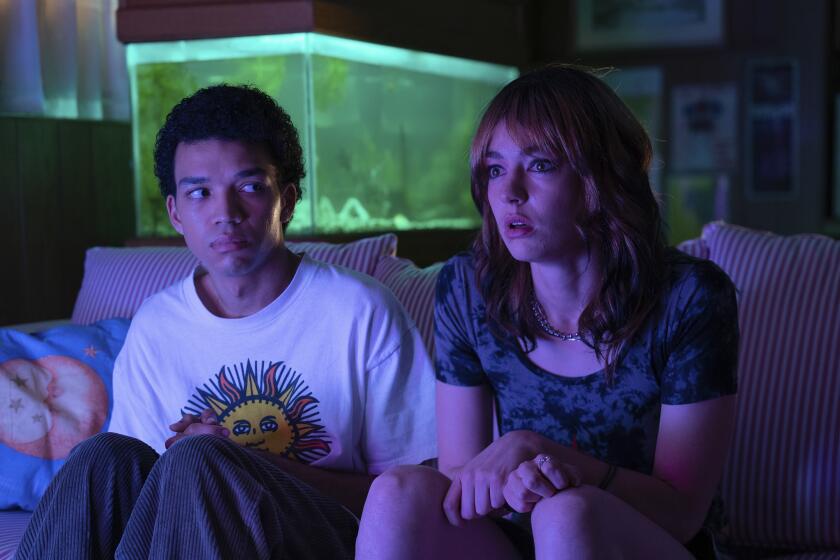At 85, Sophia Loren still works hard, loves acting and makes no apologies for her nose
Screen legend Sophia Loren comes to the California Center for the Arts, Escondido for an onstage conversation on Nov. 24
It is impossible to believe now, but there was a time in our dark entertainment past when someone in the movie business saw fit to tell Sophia Loren that she was not perfect exactly the way she was. She needed to lose weight, they said. And she needed to fix her nose.
It was so early in Loren’s career that she didn’t really have a career. At that moment in time, she was not yet the screen icon who inspired Mick Jagger and Keith Richards to write “Pass the Wine (Sophia Loren).” Or the woman who turned down a marriage proposal from Cary Grant. Or the actress who won an Oscar in 1962 for “Two Women,” becoming the first performer to win an Academy Award for a foreign-language film.
At that moment in time, Loren was a young beauty-contest winner from the very small Italian town of Pozzuoli who was in Rome for her first screen test. She had no movie experience and no clout whatsoever. What she did have was a strong sense of who she was and who she did not want to be.
All these years later, she has no regrets. Not about her nose, or anything else.
“I never thought that my nose was something I had to change,” said the actress, who will be in town on Sunday, Nov. 24, for “An Evening with Sophia Loren” at the California Center for the Arts, Escondido. “It was an interesting nose, which is why I still have never changed it. Sometimes when you are very young, you have to wait for nature to shape you on the face or on the body. Then little by little, people see the nose was much nicer than they thought.
“I couldn’t change it. Because if you do this today, what about tomorrow? No, no. I like my nose.”
Loren’s appearance in Escondido is the only West Coast stop on this personal-appearance tour. She will be taking questions from the audience, but first she will do an on-stage chat about her life and her long film career. That career started when she was an extra in the 1951 film “Quo Vadis,” and it continues to this day with her co-starring role in “La vita davanti a sé” (“The Life Ahead”), a drama directed by her youngest son, Edoardo Ponti. The film is expected to come out next year.
In “The Life Ahead,” Loren plays Madame Rosa, a Holocaust survivor who becomes the head of a non-traditional family that includes a transgender woman and a 12-year-old Senegalese immigrant boy. It is a role that was also played by Simone Signoret in 1977’s “Madame Rosa.” Loren worked 10-hour days on the film, which she told Variety pushed her “to express things on screen a way that I think audiences will find very surprising.”
It is Loren’s first feature film in 10 years, but if audiences are surprised that she is still giving her all to movies after all these years, Loren is not. She is many decades and many films away from the young nobody who wouldn’t change herself for anyone else, but she is still ferociously dedicated to the career that let her be everything she wanted to be.
“Acting for me is life. Acting is my life,” Loren said from a tour stop in Rhode Island. “Acting for me is a way to think about what I am doing and what I am able to do which I could not do before. I have learned so many things in my profession that it is a pleasure to show feelings, to show suffering and feeling joyful. It is a wonderful thing.
“In a way, I was born to do this. Every day I am able to discover things in my career that are really, really wonderful.”
Acting gold
If she was born to be a movie star, it wasn’t obvious at first. Sofia Villani Scicolone was born out of wedlock and grew up in extreme poverty. She and her mother, Romilda Villani, lived with Villani’s parents in a house where Sofia shared a bedroom with eight people. The famine brought on by World War II left her so skinny, her classmates nicknamed her “little stick.” A fall during an aerial bombardment left her with a scar on her chin.
“In the beginning when I was little, because of the war and because of some things that were not my fault or my mother’s fault, it was very difficult to live in a situation like I did,” Loren said. “But the world is what it is and you have to cope with it.”
And when she turned 14, her world changed. That was the year nature shaped Sofia Villani Scicolone’s face and body into something stunning. By 1953, the 19-year-old Sofia Loren was starring in “Aida.” By 1957, she was co-starring with Cary Grant and Frank Sinatra in “The Pride and the Passion.” And in 1960, Loren mined her painful past for deep vein of acting gold.
In “Two Women,” she played a mother doing her desperate best to provide for her daughter in a war-torn Rome. The film made her an international star and earned her an Oscar nomination. She was too intimidated to attend the awards ceremony, but she won anyway. She received a second Academy Award nomination in 1965 for “Marriage Italian Style,” and in 1991, she received an Honorary Oscar for her decades of memorable performances.
“People say, ‘You are lucky,’ and I think I have been very lucky,” said Loren, who was married to Italian film producer Carlo Ponti for 50 years, until his death in 2007. “If you work very hard and you are lucky, maybe there is the possibility for finding new things. Life is life. It can change every day.”
These days, life is good. Loren’s tour is bringing her to California, which means time with her grandchildren. (Loren lives in Geneva, Switzerland.) She has “The Life Ahead” coming out next year, which will mean a welcome reunion with movies and movie fans.
Then there is the simple fact that she is 85 years old and still doing the work she loves and still living a life that makes her happy, which means there is a good chance that someone in the California Center for the Arts audience is going to ask her how she’s pulled it off. She says there are no secrets, and maybe she’s right. But maybe the secret is asking yourself, “What would Sophia Loren do?”
And then you follow your nose.
“When I know the thing that I am going to do or the thing I want to do, I say to myself, ‘It’s time,’” Loren said. “Sometimes you are wrong. Sometimes you choose wrong. But sometimes you just reach for something that you have never reached for before.”
Sophia Loren
Born: Sept. 20, 1934, in Rome. She was raised in Pozzuoli, a small town outside of Naples.
Breakthrough moment: Being crowned one of 12 “Princesses of the Sea” in a local beauty contest. The prize was a ticket to Rome and a few rolls of wallpaper.
Breakthrough film: “Aida,” a 1953 film based on the opera by Giuseppe Verdi. Loren did not do her own singing.
Best collaborator: Italian director Vittorio De Sica, who cast her as a seductive pizza vendor in 1954’s “The Gold of Naples” and went on to direct Loren in multiple films. He directed her Oscar-winning turn in “Two Women” and her Oscar-nominated performance in “Marriage Italian Style.”
Marriage and family: Loren was married to Italian film producer Carlo Ponti for 50 years, until his death in 2007. They had two sons — Carlo Ponti Jr. (a classical music conductor) and Edoardo Ponti, who is a film director.
Occupational hazard: Loren loves her busy life, with one big exception. “The only thing I don’t like much is to fly,” she said during last week’s interview.
“An Evening with Sophia Loren”
When: 4 p.m. Sunday
Where: California Center for the Arts, Escondido. 340 N. Escondido Blvd., Escondido
Tickets: $65-$205
Phone: (800) 988-4253
Online: artcenter.org
Get U-T Arts & Culture on Thursdays
A San Diego insider’s look at what talented artists are bringing to the stage, screen, galleries and more.
You may occasionally receive promotional content from the San Diego Union-Tribune.












